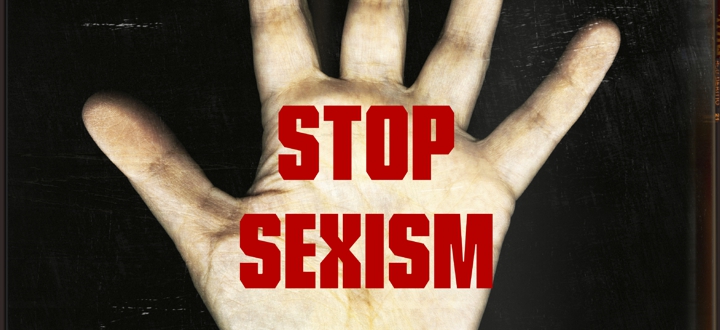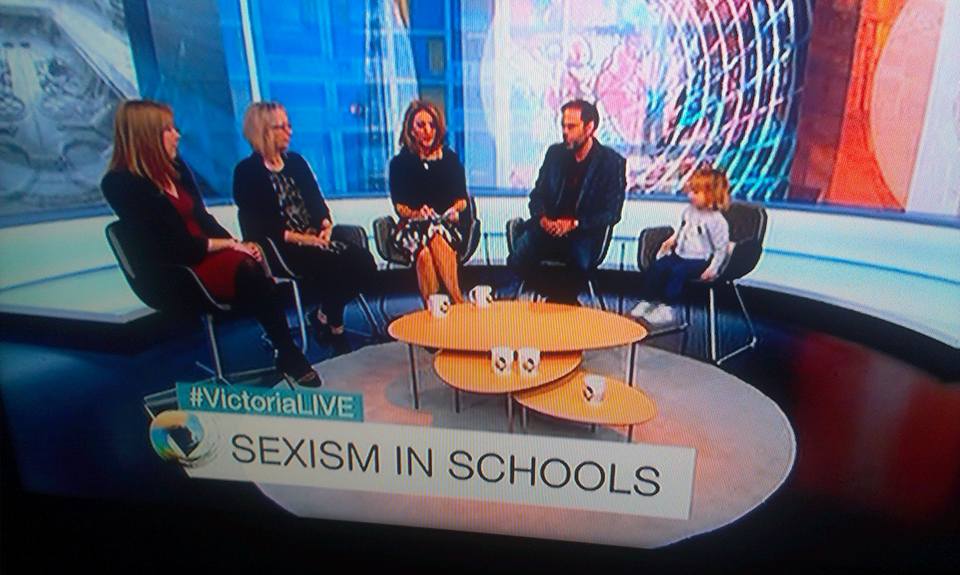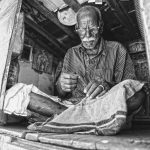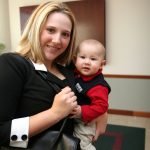
There was a little bit of unexpected excitement in my world yesterday. Toddler Adams and I, you see, were invited on to the Victoria Derbyshire Programme on BBC2. The subject being discussed was sexism in schools.
The catalyst for this conversation was a set of guidelines that has been published by the Institute of Physics. Have you ever heard of the Institute of Physics (IoP)? No, I hadn’t either until I read about it in the Sunday newspapers at the weekend.
The IOP is a charity with a remit to “advance physics education, research and application.” It’s missed a trick by failing to add “increase awareness of physics in the media”. This is exactly what the IoP has done by publishing a document called Opening Doors, a guide to good practice in countering gender stereotyping in schools.
Whether this was the intention or not, the IoP has done something incredibly sexy. Using funds provided by the Government Equalities Office, the IoP has worked in partnership with 10 schools to highlight areas where gender inequality exists in the secondary school system. Equally importantly, it’s put forward ideas for dealing with them.
Opening Doors stretches to 26 pages. I’m not going to repeat everything it says. Nonetheless, it has highlighted that teachers need to be very careful about the language they use. It has found that career guidance could be improved. It revealed many schools timetable subjects in a way that means you either follow a feminine or masculine path of subjects (my italics and my choice of words). It also suggests that language such as “gay”, “man up”, “sissy” and “cupcake” are often used in the school yard (and sometimes even by teachers) and this should no longer be tolerated.
At this point I think it’s necessary to give a little bit of background. Girls have often shied away from studying physics. The IoP has long recognised this as an issue. In previous reports it has investigated the reasons for this. It found that girls attending independent same sex schools were much more likely to study the subject than those at mixed sex state schools. In other words, the environment a child was studying in had a huge impact on what they studied.
With the Opening Doors report, the IoP has taken a step further. It has questioned why boys are more likely to study physics and less likely to study languages and English Literature. It has even queried why poor academic achievement by boys isn’t seen as a gender issue.
I have found the report and its suggestions to be fascinating reading. I won’t claim Opening Doors is perfect. I’m personally very supportive but parts of it do make me wince a little. Although well balanced, the good practice it highlights almost exclusively benefit female school pupils.
A further worry is the way the report has been interpreted and applied by some schools. I’ve read two different news reports in two different newspapers stating that schools have established girl-only groups to police playgrounds and report any sexist language they hear to teaching staff. This is a foolhardy response that sends completely the wrong message to both boys and girls.
Even so, the IoP has shone a light on some genuine problems that need addressing. It has branched out of its traditional comfort zone of physics. Explanatory notes on the IoP’s website state: “We know we have a problem with gender stereotyping of subjects in schools. This is particularly an issue for girls in maths, physics and engineering, boys in modern foreign languages and a general underperformance in GCSE grades. (This) is an excellent way to explore what happens in schools and outside, and what all of us can do to change it.”
Isn’t it fascinating that it’s taken a relatively obscure organisation like the IoP to challenge such perceptions? More to the point, the IoP has done it very well.

Oh yeah, as for the Victoria Derbyshire interview, it was a good discussion and well balanced. Toddler Adams thoroughly enjoyed it. She interrupted part way through and asked me to read her a story. We also bumped into Daniella Westbrook backstage and she was incredibly complimentary about my little one.
Most interesting of all was what happened afterwards. I was walking down Regent Street in London, just a couple of minutes away from BBC Broadcasting House, where the discussion had taken place.
To my amazement I was stopped in the street by a woman who had seen the show and recognised us both (needless to say, I was flabbergasted at this and didn’t quite know how to respond!). It turned out she was a retired school teacher. She explained that during her professional life she had, without thinking about it, used sexist language with her pupils.
Waving her index finger in the air she said “I was wrong.” It seems the IoP has struck a chord.







32 thoughts on “A few thoughts about sexism in schools”
I must try to watch it on iPlayer as toddler Adams sounds to have been very cute. On the issue, it’s certainly a worthwhile study as often it’s the seemingly small things such as language that can define cultural acceptability. I know from my teacher wife that timetabling subjects can be tricky but certainly her school does try its utmost to cater for less common combinations.
To be honest, Elizabeth stole the show! I’d be interested to know what your wife thought about this subject. The guidelines pull no punches and make quite clear that teachers can be very guilty of using unacceptable language. It’s not just a playground problem.
That is a problem here in the states as well. Don’t let the American politicians fool you. Our education system is grossly underfunded and the approach to how to educate our young people is so far from what they really need, it’s frustrating both as a parent and as a child advocate to see good teachers leave their position because of all of the red tape. The IOP sounds like a great organization! Visiting from #themadmidweekbloghop
Thanks for stopping by Michelle. I hope I don’t get myself in trouble, but the impression I have of the US system is that it’s packed full of misogyny! The whole football team / cheerleader thing and then the Frat boy culture at university, well, it doesn’t paint a rosy picture. Not, you understand, that I’m saying the UK system is perfect. Far from it. And don’t get me started on the funding of he British education system!
As you say it is very interesting that a seemingly random organisation took on the issue of sexism at school. I suppose it is an organisation, which has trouble attracting girls.
I find it very interesting that same sex schools produce different attitude in pupils, about which subjects they focus on. Maybe this is the way to go?
Sexism surrounds us. I am very aware of it when reading some traditional stories to my toddler. All those knights being brave and ladies demure and obedient. We take these stories for granted, as harmless fairy-tales, but they do influence how our children’s perception of the world is shaped.
#brilliantblogposts
Unfortunately sexism is all around us and the IOP guidelines talk of this as “unconscious bias” that we can all be guilty of. It was spoken about at some length during the TV interview, including how it appears in books.
I had heard of the IoP (I did Physics A level and hubby did a Physics degree) but I didn’t realise that they were working to battle sexism in schools. I didn’t realise that there was such a difference in uptake of perceived “masculine” subjects with girls in same sex schools – that said I went to a mixed set school and was one of only five girls who did Physics A level. Girl-only groups reporting on sexist language is definitely missing the point – it implies that sexism only negatively affects girls when of course it affects both genders. Glad that Toddler Adams enjoyed the experience and that you managed to strike a chord with at least one former teacher.
Oh wow, a family of physicists! That’s great! I was taken aback at the huge gulf between what boys and girls study. It had never really occurred to me how lessons are timetabled but this was a massive issue at my school. You either did metalwork and woodwork or needlework and home economics. There was no deviation from this pattern.
I’m a primary school teacher so my experience is a little different as we work very hard to give children the same opportunities regardless of whether they’re a boy or a girl, and I suppose the way that the timetable works allows for that; all children do the same activities together. I think this is probably a far greater issue in secondary than primary, but from my limited experience through transition work with our local comp I agree it exists. Interestingly I went to an all girls private secondary school and we did all lessons as it was encouraged, the only sexism I encountered there was from a male DT teacher who thought we were too fragile to use the equipment.
My schooling ensured that I hadn’t encountered this gender stereotype in limitations and I’ve always struggled with the need for feminism as a result, because I’ve never been held back for being a woman. I am with you on the need to promote equality of opportunity rather than promote males or females more than the other.
The IoP guidelines are for secondary schools. I think unconscious bias exists in primaries as well as secondaries but it must be a bigger problem in the secondary schools. Timetabling was a massive issue at my school. I hope my daughters don’t face such issues.
It sounds like the IOP has done an excellent job in highlighting this issue. I must say I was surprised when my son started secondary school at how separate their games lessons and games kits are – rugby is a boys’ sport and hockey is a girls’ sport and that’s all there is to it! I can’t believe that teachers would use words like ‘gay’ and ‘sissy’.
Wow, that’s amazing that you bumped into a retired teacher like that and she admitted she had been wrong.
I will be interested to see how my kids fair when they go to secondary school. I hope they don’t encounter anything quite like your kids but I suspect they will. As for bumping into the retired teacher, I was speechless! You kinda do these things and don’t expect to be recognised.
it’s really interesting to hear that a study like this exists and I’m pleased that it does. It’s funny though, because whilst these types are studies are taking place, we are also being told by our primary schools that boys and girls learn in different ways and that their education should be adapted to suit these differences. I applaud both ideas, but at the same time they also seem a little at odds with one another. I guess the ideal situation would be to embrace differences, but in no way allow them to be a barrier to anyone choosing their path in life x
It is an interesting paradox isn’t it? For a while I helped out at my daughter’s school and the boys were guaranteed to be one reading scheme behind the girls. I can well appreciate the two genders learn differently, but I have no idea what the answer is. I think all the IoP is suggesting is a fair chance for all which seems correct to me.
I did physics at school and then an engineering degree at University. I graduated twenty years ago (yikes!) and I find it a little (actually a lot) depressing that we’re still having the same conversations that went on when I was at school/uni and that we don’t seemed to have moved on much. This sounds like a good study, and I’m really glad to see that it’s getting publicity and being discussed. And, I’m really pleased to see that it’s addressing the gender issues on both sides, with the arts as well as sciences. It should be all about equality and opportunities, for both boys and girls x
Physics and engineering. Wow, I’d be delighted if my girls did the same. Very interesting to hear your perspective with that background. I think the IoP has done an amazing thing by widening the debate and not solely focusing on getting girls into physics. It gives their guidelines more credence.
I remember having no interest whatsoever in maths and physics at school (a mixed comprehensive) and no-one ever seemed to care or encourage people like me to take an interest. It was a long time ago so I don’t really remember specific sexist language being used but i do remember wishing that I’d gone to an all girls school because my classes were often disrupted by the boys. That’s probably a different issue but I think you’re right – good on the IoP for highlighting this – it’s high time careers advice and general focus in schools was more balanced. I’ll have to pop over to the iPlayer too now 🙂 Thanks for linking up to #thetruthabout
I am going to disagree with you, in the politest possible way. You say your lessons were interrupted by boys. The IoP’s guidelines specifically stated that academic underachievement of boys (a growing problem, while girl’s are steadily doing better and better) should be addressed as a gender issue. Why were those boys messing about in class? Poor support at home? Picked on by teachers who had already written them off? Living in a culture that says study is geeky and uncool? I bet it was a mixture of all the former….and much more! Exactly the same happened at my school and it’s very sad to think of people such as yourself being so put off by it they would rather have studied at a single sex establishment. As someone with two daughters and no sons, I will certainly be keeping your comments in mind. I don’t want my kids to feel that way in school. Great comment, thank you!
I feel an enormous responsibility as a mum of two boys to bring them up knowing women are their equals. It is quite difficult at the moment as my eldest is 6 and runs screaming from anything pink and thinks most girls are ‘silly’, essentially because they no nothing about Ninjago! Great Post. #Thetruthabout
What is njnjano??
Yeah, ggod question, what is Ninjano??
With two daughters, I feel exactly the same responsibility to raise them knowing that men are equals and that if they wish to study physics or become fighter pilots, they should give it their best shot. Alas though, my eldest does sometimes shy away from playing with boys. I think at her age (6) it’s quite natural.
Wow good for you and what a great discussion I don’t think like this retired teacher many thing of and they should. Thank you ever so much for linking up to Share With Me. I hope to see you again tomorrow for another great round up and hope you have been enjoying the blog hop. #sharewithme
It was a great discussion to be a part of and it’s great to see the issue being discussed openly. It’s of such importance to both boys and girls. And yes, I’ll be back to #sharewithme this week.
Like Claire I feel a massive responsibility to raise my boys to be men who see people as people and judge on those merits only not on well she’s a girl so I’m not talking to her, well he’s a boy that did a girl’s subject etc.
I think the problem starts that we have all been ingrained from childhood what is girl /boy acceptable and it’s hard to break those stereotypes. It’s only now I have children that I am questioning it myself. So if they go through primary school with the same underlying sexism then it’s going to continue into secondary school and we need to break the cycle.
Oh and I have a Masters in chemistry and work(ed) in the male dominated field of corporate banking. Your sex should never stop you achieving your dreams.
The IoP talked about “unconscious bias” (I think that was the phrase used), something teachers and parents can be very guilty of. As you say it starts very young. The IoP’s guidelines were for secondary schools but wouldn’t it be great if the next step was a guide for primary schools? A Masters in chemistry. My word, you are making me feel very underqualified.
Sexism is everywhere and I honestly believe that it is getting worse. I think anonymity of the internet has a lot to do with it. It encourages and permits sexist and abusive behaviour which then permeates society and breeds further. I think schools have a massively important role to play in shaping the society of the future and I am really good that the IoP at least has recognised that.
sorry #TheTruthAbout
Well done, John. It’s good that the IoP’s work is helping to raise discussion about this issue and highlighting how easy it is to slip into sexist language inadvertently. What can be seen by many as simple terms of endearment can easily be taken otherwise. Is this overreacting and excessive political correctness? I don’t think it is. The issue of girls shying away from science is a long-standing one, and whatever the root cause of that is it is worth focussing on. It’s certainly not down to a lack of ability on girls’ part. My wife was one of a small minority of female scientists at uni, and while my degree was also in science it was she who went on to do a D.Phil (while I was busy propping up the bar …)
Another family of scientists! Amazing. I think the IoP has done something amazing in branching out of its traditional stomping ground of science. The explicit message is; more girls should be doing science and working in the science and more boys should studies humanities and work in caring occupations. In some respects it is quite revolutionary and it does start with language because this creates an unconscious bias at a young age that it’s difficult to put right in later years. By then the damage is done.
Omg- really! Feminism IS equality! Look it up before your daughter has to do it for you *sigh*
Language is everything, as this report points out. Feminism may be equality but we all know it is a word loaded with meaning. The report makes it clear there is an issue with boys not studying various subjects as they are perceived to be feminine. I suspect we aren’t going to agree on this, but a simple change of phrase to equalities instead of feminism would strip loaded, gender-specfic terms from this report and make it more acceptable to all.